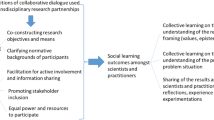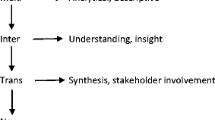This paper explores the roles of transnational civil society organizations and networks in transnational social learning. It begins with an investigation into social learning within problem domains and into the ways in which such domain learning builds perspectives and capacities for effective action among domain organizations and institutions. It suggests that domain learning involves problem definition, direction setting, implementation of collective action, and performance monitoring. Transnational civil society actors appear to take five roles in domain learning: (1) identifying issues, (2) facilitating voice of marginalized stakeholders, (3) amplifying the importance of issues, (4) building bridges among diverse stakeholders, and (5) monitoring and assessing solutions. The paper then explores the circumstances in which transnational civil society actors can be expected to make special contributions in important problem domains in the future.


Similar content being viewed by others
REFERENCES
Argyris, C., and Schön, D. A. (1996). Organizational Learning II: Theory, Method, and Practice, Addison-Wesley Publishing, Reading, MA.
Austin, J. (2000). Strategic collaboration between nonprofits and businesses. Nonprofit and Voluntary Sector Quarterly 29(1), 69–97.
Bartley, T. (2003). Certifying forests and factories: States, social movements, and the rise of private regulation in the apparel and forest products fields. Politics and Society 31(3), 433–464.
Batliwala, S. (2002). Grassroots movements as transnational actors: Implications for global civil society. Voluntas 13(4), 393–410.
Batliwala, S., and Brown, L. D. (eds.) (2006). Transnational Civil Society: An Introduction, Kumarian Press, Bloomfield, CT.
Boli, J., and Thomas, G. M. (1999). Constructing World Culture: International Nongovernmental Organizations since 1875, Stanford University Press, Stanford.
Botkin, J. W., Elmandjra, M., and Malitza, M. (1979). No Limits to Learning: Bridging the Human Gap. A Report to the Club of Rome, A. Wheaton, Exeter, UK.
Brechin, S. (ed.) (2003). Contested Nature: Promoting International Biodiversity Conservation with Social Justice in the Twenty-First Century, State University of New York Press, Albany, NY.
Brown, L. D. (1991). Bridging organizations and sustainable development. Human Relations 44(8), 807–831.
Brown, L. D. (1999). Social learning in south-north coalitions: Constructing knowledge systems across social chasms. In: D. Lewis (ed.), International Perspectives on Voluntary Action, Earthscan, London.
Brown, L. D., and Ashman, D. (1999). Social capital, mutual influence, and social learning in intersectoral problem-solving. In: D. Cooperrider and J. Dutton (eds.), Organizational Dimensions of Global Change, Sage, Thousand Oaks, CA, pp. 139–167.
Brysk, A., and Jacquemin, C. (2006, forthcoming). Human rights: Bridging borders. In: S. Batliwala and L. D. Brown (eds.), Transnational Civil Society: An Introduction, Kumarian Press, Bloomfield, CT.
Cash, D. W. (2001). In order to aid in diffusing useful and practical information: Agricultural extension and boundary organizations. Science, Technology and Human Values 26(4), 431–453.
Clark, J. D. (ed.) (2003a). Globalizing Civic Engagement: Civil Society and Transnational Action, Earthscan, London.
Clark, J. D. (2003b). Worlds Apart: Civil Society and the Battle for Ethical Globalization, Kumarian Press, Bloomfield, CT.
Clark, W. C. (2001). Social learning. In: A. S. Goudie and D. J. Cuff (eds.), Encyclopedia of Global Change: Environmental Change and Human Society, Oxford University Press, Oxford, pp. 382–384.
Dudley, N., and Stolton, S. (1999). Partnerships for Protection: New Strategies for Planning Management for Protected Areas, Earthscan, London.
Edwards, M. (2004). Civil Society, Polity Press, Cambridge, UK.
Edwards, M., and Gaventa, J. (2001). Global Citizen Action, Lynne Rienner, Boulder, Colorado.
Eijndhoven, J. V., Clark, W. C., and Jager, J. (2000). The long-term development of global environmental risk management: Conclusions and implications for the future. In: The Social Learning Group (Ed.), Learning to Manage Global Environmental Risks, MIT Press, Cambridge, MA, pp. 181–197.
Finger, M., and Verlaan, P. (1995). Learning our way out: A conceptual framework of social-environmental learning. World Development 23(3), 503–513.
Finnemore, M. (1998). International norm dynamics and political change. International Organization 52(4), 887–917.
Florini, A. (2003). The Coming Democracy: New Rules for Running a New World, Island Press, Brookings Institution, Washington, DC.
Florini, A. M. (ed.) (2000). The Third Force: The Rise of Transnational Civil Society, The Japan Center for International Exchange and Carnegie Endowment for International Peace, Tokyo and Washington, DC.
Fox, J., and Brown, L. D. (eds.) (1998). The Struggle for Accountability: The World Bank, NGOs, and Grassroots Movements, MIT Press, Cambridge, MA.
Galtung, F. (2000). A global network to curb corruption: The experience of Transparency International. In: A. Florini (ed.), The Third Force: The Rise of Transnational Civil Society, The Japan Center for International Exchange and Carnegie Endowment for International Peace, Tokyo and Washington, DC, pp. 17–47.
Gordenker, L., and Weiss, T. H. (1995). NGO participation in the international policy process. Third World Quarterly 16(3), 543–555.
Gray, B. G. (1989). Collaborating: Finding Common Ground for Multiparty Problems, Jossey-Bass, San Francisco, CA.
Hall, A. (1992). From victims to victors. In: M. Edwards and D. Hulme (eds.), Making a Difference, Earthscan, London, pp. 148–158.
Hajer, M. A. (1995). The Politics of Environmental Discourse, Ecological Modernization, and the Policy Process, Clarendon Press, Oxford.
Hoffman, A. J. (2001). From Heresy to Dogma: An Institutional History of Corporate Environmentalism, Stanford University Press, Stanford.
Ingelhart, R. (1990). Culture Shift in Advanced Industrial Societies, Princeton University Press, Princeton, NJ.
Johnson, D. A. (1986). Confronting corporate power: Strategies and phases of the Nestlé Boycott. In: L. Preston and J. Post (eds.), Research in Corporate Social Performance and Policy 8, JAI Press, Greenwich, CT, pp. 323–344.
Johnson R. (2000). Advocates and activists: Conflicting approaches on nonproliferation and the Test Ban Treaty. In: A. M. Florini (ed.), The Third Force: the Rise of Transnational Civil Society, The Japan Center for International Exchange and Carnegie Endowment for International Peace, Tokyo and Washington, DC, pp. 49–81.
Kaldor, M. (2003). Global Civil Society: An Answer to War, Polity Press, Cambridge, UK.
Keane, J. (2003). Transnational Civil Society, Cambridge University Press, Cambridge.
Keck, M., and Sikkink, K. (1998). Activists Beyond Borders, Cornell University Press, Ithaca, NY.
Khagram, S. (2004). Dams and Development: Transnational Struggles for Water and Power, Cornell University Press, NY.
Khagram, S., Riker, J., and Sikkink, K. (eds.) (2002). Restructuring World Politics: Transnational Social Movements, Networks and Norms, University of Minnesota Press, Minneapolis, Minnesota.
Klandermans, B. (1997). The Social Psychology of Protest, Blackwell, Oxford, UK.
Korten, D. C. (1981). The management of social transformation. Public Administration Review 41(6), 609–618.
Lee, K. N. (1993). Compass and the Gyroscope: Integrating Science and Politics for the Environment, Island Press, Washington, DC.
Lindenberg, M., and Bryant, C. (2001). Going Global: Transforming Relief and Development NGOs, Kumarian Press, Bloomfield, CT.
Milbrath, L. W. (1989). Envisioning a Sustainable Society: Learning Our Way Out, State University of New York Press, Albany, NY.
Mock, G. (2003). Undue influence: Corruption and natural resources. In: World Resources 2002–2004, World Resources Institute, Washington, DC, pp. 36–37.
Najam, A. (1996). Understanding the third sector: Revisiting the prince, the merchant, and the citizen. Nonprofit Management and Leadership 7(2), 203–219.
Nye, J., and Donahue, K. (eds.) (2001). Governance in a Globalizing World, Brookings Institution, Washington, DC.
Pettifor, A. (2000). Jubilee 2000 and the multilateral institutions. In: M. Lavoie (ed.), Human Security: New Definitions and Roles for Global Civil Society, Forum International de Montreal, Montreal, Canada, pp. 25–29.
Rischard, J. F. (2002). High Noon: Twenty Global Problems, Twenty Years to Solve Them, Basic Books, New York.
Risse T. (2000). The power of norms versus the norms of power: Transnational civil society and human rights. In: A. M. Florini (ed.), The Third Force: the Rise of Transnational Civil Society, The Japan Center for International Exchange and Carnegie Endowment for International Peace, Tokyo and Washington, DC, pp. 177–209.
Risse, T. S., Ropp, C., and Sikkink, K. (eds.) (1999). The Power of Human Rights: International Norms and Domestic Change, Cambridge University Press, Cambridge, UK.
Rodrigues, M. G. M. (2004). Advocating for the environment. Environment 46(2), 14–25.
Rondinelli, D. (1983). Development Projects as Policy Experiments, Methuen, New York.
Ruggie, J. G. (2003). Taking embedded liberalism global: The corporate connection. In: D. Held and M. Koenig-Archibugi (eds.), Taming Globalization: Frontiers of Governance, Polity Press, Cambridge, UK, pp. 93–129.
Ruggie, J. G. (2002). Lecture on the Global Compact at Harvard University’s Kennedy School of Government.
Smith, J., Chatfield, C., and Pagnucco, R. (eds.) (1997). Transnational Social Movements and World Politics: Solidarity beyond the State, Syracuse University Press, Syracuse, NY.
Snow, D., and Bedford, R. (1988). Ideology, frame resonance, and participant mobilization. In: B. Klandermans, H. Kriesi, and S. Tarrow (eds.), From Structure to Action: Comparing Social Movement Research Across Cultures, JAI Press, Greenwich, CT, pp. 197–218.
The Social Learning Group (2001). Learning to Manage Global Environmental Change, MIT Press, Cambridge, MA.
Taylor, R. (ed.) (2004). Creating a Better World: Interpreting Global Civil Society, Kumarian Press, Bloomfield, CT.
Weber, E. P. (2003). Bringing Society Back In: Grassroots Ecosystem Management, Accountability and Sustainable Communities, MIT Press, Cambridge, MA.
Zadek, S. (2004). The path to corporate responsibility. Harvard Business Review 82(12), 1–9.
ACKNOWLEDGMENTS
The authors would like to thank Clive Goodinson for designing the graphics for this article.
Author information
Authors and Affiliations
Corresponding author
Rights and permissions
About this article
Cite this article
Brown, L.D., Timmer, V. Civil Society Actors as Catalysts for Transnational Social Learning. Voluntas 17, 1–16 (2006). https://doi.org/10.1007/s11266-005-9002-0
Published:
Issue Date:
DOI: https://doi.org/10.1007/s11266-005-9002-0




